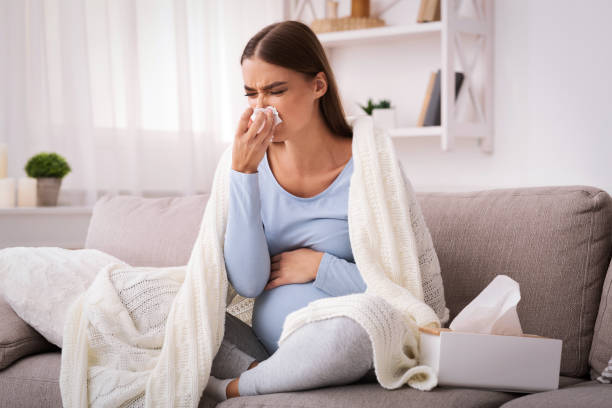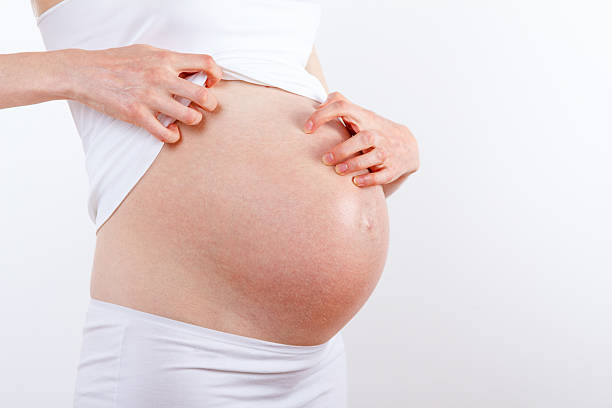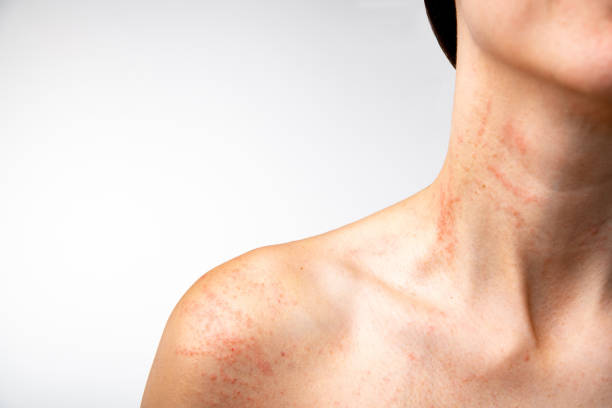Allergies During Pregnancy: How to Effectively deal with it

Pregnancy is a time of excitement and anticipation, but it can also be a time of uncertainty and concern. One issue that many pregnant women face is allergies, which can range from mild to severe and can cause a variety of symptoms such as sneezing, itching, and congestion.
Allergies during pregnancy are difficult to deal with, as some medications that are safe for normal women are not recommended during pregnancy.
In this blog post, we will discuss how to effectively deal with allergies and pregnancy, including tips for managing symptoms and strategies for preventing allergic reactions.
Whether you’re a first-time mom or have been through pregnancy before, this guide will provide you with the information you need to stay healthy and comfortable throughout your pregnancy.
Table of Contents
What are allergies

Allergies are a response of the body’s immune system to substances that it perceives as foreign and potentially harmful, called allergens. Common allergens include pollen, certain foods, insect stings, pet dander, and mould.
When a person with allergies comes into contact with an allergen, their immune system overreacts and releases a chemical called histamine. Histamine causes a range of symptoms, including itching, swelling, redness, and inflammation. Allergies can affect many different parts of the body, such as the skin, nose, eyes, throat, lungs, and digestive system.
Allergies can range from mild to severe, and their severity can vary from person to person. Mild allergies may cause minor symptoms like sneezing, runny nose, and hives. Moderate allergies may cause more significant symptoms like difficulty breathing, wheezing, and chest tightness. Severe allergies can cause a life-threatening reaction called anaphylaxis, which can include symptoms like difficulty breathing, swelling of the face and throat, rapid heartbeat, and loss of consciousness.
You might be interested: The 10 Most Healthful Traditional American Dishes!
Importance of treating allergies during pregnancy
Treating pregnancy allergies is important for both the mother and the developing baby. Allergies cause discomfort and affect the quality of life for the pregnant woman, and can also potentially harm the fetus.
Uncontrolled allergies during pregnancy increase the risk of complications such as preterm labour, preeclampsia, and fetal distress. Allergic reactions can also cause changes in blood pressure, heart rate, and breathing, which can have a negative impact on both the mother and the baby.
Additionally, some allergy medications are not safe to use during pregnancy, and can potentially harm the developing fetus. It is important for pregnant women to work closely with their healthcare provider to determine which allergy medications are safe to use and which ones should be avoided.
Common Allergies during Pregnancy

Pregnancy can make a woman more susceptible to allergies, and some women may experience new allergies during pregnancy. Some of the most common allergies during pregnancy include:
- Seasonal allergies: Pregnant women may experience allergies to seasonal triggers such as pollen, grass, and mould.
- Food allergies: developing food allergies during pregnancy is one of the most frequent experiences pregnant women feel. Common food allergens include peanuts, tree nuts, shellfish, and dairy.
- Allergic rhinitis: Also known as hay fever, allergic rhinitis is a common allergy that can cause symptoms like a runny nose, sneezing, and itchy eyes.
- Asthma during Pregnancy: Asthma is a chronic condition that can cause wheezing, chest tightness, and difficulty breathing. Pregnant women with asthma may experience an increase in symptoms during pregnancy.
- Skin allergy during pregnancy: How to Effectively deal with it: Pregnancy hormones can cause changes in the skin, and some women may develop skin allergies to products like lotions, soaps, and laundry detergents.
developing allergies during pregnancy is normal, pregnant women should identify their allergy triggers and take steps to avoid them whenever possible.
Coping with Allergies During Pregnancy
Allergies during pregnancy can be a challenge for many women. Here are some tips to help cope with allergies while pregnant:
- Identify triggers: If you don’t know what you’re allergic to, it can be difficult to avoid triggers. See an allergist to determine what you’re allergic to and how to avoid them.
- Manage symptoms: If you’re experiencing symptoms such as sneezing, coughing, and congestion, talk to your doctor about safe ways to manage them during pregnancy. Saline nasal sprays and humidifiers can also help.
- Avoid triggers: Once you know what you’re allergic to, do your best to avoid triggers. For example, if you’re allergic to pollen, stay indoors during peak pollen season and keep your windows closed.
- Use safe medications: Some medications, like antihistamines, are generally safe to use during pregnancy. However, always talk to your doctor before taking any medication during pregnancy.
- Practice good hygiene: Washing your hands frequently, avoiding touching your face, and taking a shower before bed can help reduce exposure to allergens.
- Consider immunotherapy: Immunotherapy, also known as allergy shots, can be a safe and effective way to reduce allergy symptoms. Talk to your doctor to see if this is a good option for you.
- Stay informed: Keep up-to-date with the latest research and recommendations for managing allergies during pregnancy. Talk to your doctor or a trusted healthcare provider for guidance.
Natural remedies for allergies during pregnancy
Here are some natural remedies that may help alleviate allergy symptoms during pregnancy:
- Nasal irrigation: Using a saline nasal rinse or Neti pot can help clear out mucus and allergens from the nasal passages.
- Steam inhalation: Inhaling steam from a bowl of hot water or taking a warm shower can help relieve congestion and soothe irritated nasal passages.
- Honey: Consuming local honey may help reduce allergy symptoms, as it contains small amounts of pollen that can help the body build immunity to the allergen.
- Vitamin C: Foods rich in vitamin C, such as citrus fruits, bell peppers, and broccoli, may help reduce inflammation and boost the immune system.
- Quercetin: This natural flavonoid found in foods like apples, berries, and onions may help reduce allergy symptoms by stabilizing mast cells, which release histamine during an allergic reaction.
- Probiotics: Taking probiotic supplements or consuming probiotic-rich foods like yoghurt and kefir may help improve gut health and reduce inflammation, potentially reducing allergy symptoms.
It’s important to note that while these natural remedies may provide some relief, they should not replace medical treatment or advice from your healthcare provider. Always talk to your doctor before trying any new remedies, especially during pregnancy.
Helpful Tips for Managing Allergies and Pregnancy
Here are some tips for managing allergies during pregnancy:
- Avoid allergens: Once you know your triggers, take steps to avoid them. For example, if you’re allergic to pollen, stay indoors during peak pollen times, keep your windows closed, and use an air purifier with a HEPA filter.
- Practice good hygiene: Wash your hands frequently and avoid touching your face, especially if you’ve been in contact with allergens.
- Keep your home clean: Regularly clean your home to remove dust, pet dander, and other allergens. Use a vacuum cleaner with a HEPA filter, and consider using allergen-proof covers for your mattress and pillows.
- Use nasal saline rinses: Nasal saline rinses can help flush out allergens and reduce congestion. Ask your healthcare provider for recommendations on how to properly use them.
- Consider non-medication remedies: Some natural remedies, such as steam inhalation and saline nasal sprays, can help alleviate allergy symptoms. Talk to your healthcare provider about which remedies may be safe for you to try.
- Use medications as directed: If your symptoms are severe or you’re struggling to manage them with non-medication remedies, your healthcare provider may recommend medications. Make sure to use them as directed and only take medications that have been approved by your healthcare provider.
Remember, managing allergies during pregnancy is important for both your health and the health of your developing baby. Work with your healthcare provider to develop a personalized plan for managing your allergies during pregnancy.
When to Seek Medical Help
While most allergy symptoms during pregnancy are mild and can be managed with lifestyle changes and over-the-counter remedies, there are certain situations where you should seek medical help. Below are some of those instances:
- Severe symptoms: If you’re experiencing severe symptoms, such as difficulty breathing, rapid heartbeat, or swelling of the face or tongue, seek emergency medical attention immediately.
- Symptoms that persist or worsen: If your symptoms aren’t improving or are getting worse despite home remedies or over-the-counter medications, talk to your healthcare provider.
- Medication concerns: If you’re taking medication for your allergies and have concerns about its safety or potential side effects, talk to your healthcare provider.
- Other health conditions: If you have other health conditions, such as asthma or a history of severe allergic reactions, you may be at increased risk for complications from allergies during pregnancy. Talk to your healthcare provider about how to manage your allergies safely.
- Changes in fetal movement: If you notice a decrease in fetal movement or any other concerning symptoms during pregnancy, seek medical attention immediately.
It’s always better to be safe than sorry when it comes to your health and the health of your developing baby. If you’re unsure whether your symptoms warrant medical attention, talk to your healthcare provider. They can help you determine the best course of action.
Allergy Medications during Pregnancy for Severe Allergies
If you’re experiencing severe allergies during pregnancy, it’s important to seek medical help from your healthcare provider. They can help you determine the best course of treatment based on your specific situation.
Here are some treatment options that may be considered for severe allergies during pregnancy:
- Epinephrine: If you’re experiencing a severe allergic reaction, such as anaphylaxis, your healthcare provider may prescribe an epinephrine auto-injector. Epinephrine can quickly reverse the symptoms of an allergic reaction and prevent potentially life-threatening complications.
- Corticosteroids: In some cases, your healthcare provider may prescribe oral or inhaled corticosteroids to help reduce inflammation and relieve severe allergy symptoms.
- Immunotherapy: Allergy shots, or immunotherapy, may be recommended if you have severe allergies that aren’t responding to other treatments. This involves receiving injections of small amounts of the allergen over time to help your body build up a tolerance to it.
- Hospitalization: In rare cases, severe allergies during pregnancy may require hospitalization. This may be necessary if you’re experiencing anaphylaxis or other severe allergic reactions that require close monitoring and immediate medical intervention.
can early pregnancy make allergies worse?
Research conducted by a Popular health blog shows that allergic symptoms in pregnant women vary by person as some women feel their allergies worsen, others think they remain just the same and others report having lesser allergic effects during pregnancy.
Conclusion: Allergies and pregnancy
In conclusion, allergies can be a challenging issue during pregnancy. However, with proper management, you can effectively deal with them and minimize the impact they have on your health and your developing baby’s health.
By identifying your triggers, avoiding allergens, practising good hygiene, using natural remedies, and seeking medical help when needed, you can successfully manage your allergy symptoms during pregnancy.
Remember, always work closely with your healthcare provider to develop a personalized plan for managing your allergies and never hesitate to seek medical help if you’re experiencing severe symptoms or concerns.
With the right strategies in place, you can have a safe and healthy pregnancy despite dealing with allergies.




3 Comments